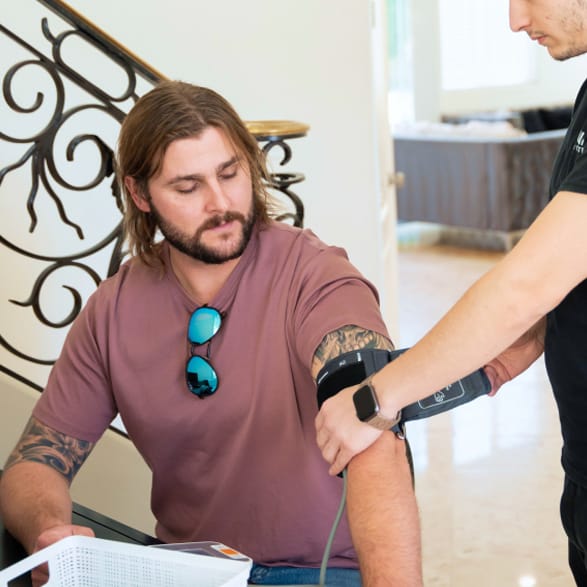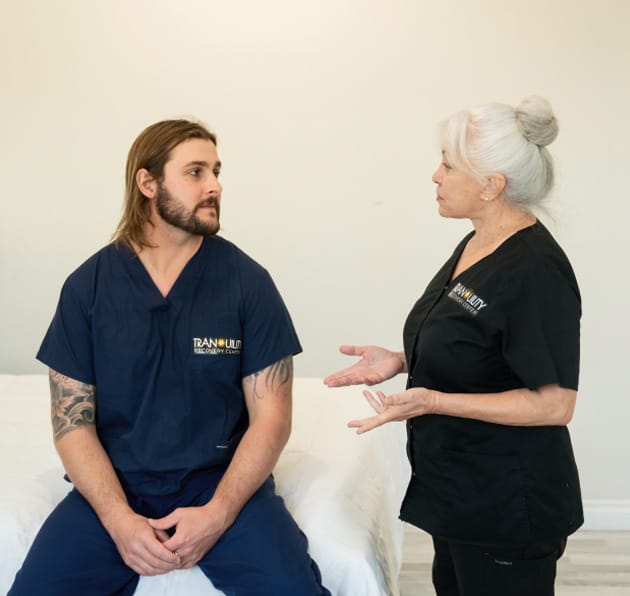Relapse Prevention Program
Develop Essential Tools to Maintain Long-term Sobriety, Manage Triggers, and Prevent Relapse With Confidence.
Start Your Journey Today
For those with experience of substance or alcohol abuse, the fear of relapse is real and an important one to understand. Relapse would imply going back to drinking or substance use after going through a recovery program or trying to stop using substances or alcohol. Recovery is a non-linear process, and relapse is not an unusual occurrence for those struggling with alcohol use disorder (AUD) or substance use disorder (SUD). Going back to old habits is not a failure but rather an invitation to prioritize your health. We are here to support you with the relapse prevention program California experts strongly recommend. Contact Tranquility Recovery Center today and let us guide you to long-lasting sobriety.
We strive to assist you in handling addiction issues lifelong. Successful management implies occasional sit-backs, but with our support, you will experience them seldom and overcome them with ease. Our expert staff and tailored treatments will empower you to face any future struggle, and our relapse prevention program in California will ensure you are ready for this particular challenge.
Understanding Relapse: What It Means and Why It Happens
The American Psychological Association (APA) defines relapse as a recurrence of a disorder after a period of improvement or apparent care. They also use the term to explain the recurrence of substance or alcohol abuse after a period of abstinence. Relapse can happen due to many different factors, such as peer pressure, testing one’s boundaries, and the appearance of certain triggers, like stress. These factors typically trigger an emotional response, leading individuals to relapse into alcohol or substance abuse.
Relapse typically does not occur suddenly. It’s rather a process that goes through three different stages:
- Emotional stage of relapse. In the emotional stage of relapse, it is usual to feel discomfort and vulnerability. Other emotions, both positive and negative, can take place. Factors or triggers for relapse can cause you to feel stressed, sad, overwhelmed, or even happy, contributing to eventual relapse.
- Cognitive or mental stage of relapse. In this phase, thoughts of using alcohol or substances again emerge. Recurrent thoughts and ruminations, imagining what it would be like to use again or remembering what it felt like, are a usual occurrence.
- Physical or behavioral stage of relapse. This is the final stage of experiencing relapse, and it entails going back to using alcohol or a substance of your choice. This is when an addiction returns.
Our relapse prevention program in California works on empowering individuals to deal with the emotional and cognitive stages of relapse successfully. Suppose a person were to enter a physical stage of relapse, meaning they went back to using. In that case, professional help is required to overcome this phase of managing one’s substance or alcohol addiction.
Below is a detailed list of the addiction treatments available at our facility:
Therapies Provided During Rehab
Following detox, recovery continues with comprehensive therapy and rehabilitation. At Tranquility Recovery Center, we provide:
Testimonials
Hear From Those We've Helped
Get in Touch Today
Let's get started by gathering some basic information from you.
The Importance of a Relapse Prevention Program
Dealing with or managing substance abuse or alcohol abuse issues requires inner strength. However, professionals who understand methods and techniques often guide and direct this strength to help you use it effectively. Entering a relapse prevention program in California means the following:
- You will receive personalized care and expert guidance. While in a professional relapse program, such as the one provided by Tranquility Recovery Center, you can expect tailored support that addresses your specific triggers and challenges. Having a program specifically crafted for you means you get to deal with personal issues and learn to manage your environment, which acts as a trigger.
- You can count on long-term support. Tranquility Recovery Center ensures you feel supported even after leaving our residential treatment and relapse prevention program. We remain at your disposal for consultations and ongoing psychotherapy. We also include you in various support groups that provide additional motivation, support, and inspiration for overcoming these life challenges.
- You will have a safe space for recovery. Our facilities provide safety, security, and peace, and our professional staff ensures you feel psychologically safe as well. In this compassionate and understanding environment, your anxiety will decrease, and your motivation will rise. This overall healing climate supports the success of your recovery program.
Key Strategies for Relapse Prevention
Since relapse has several stages, you can learn certain strategies and techniques to manage the early stages and prevent relapse from fully occurring. In the Tranquility Relapse Prevention Program, you will learn to identify and manage your triggers for substance or alcohol use, other strategies to manage emotions caused by such triggers, and how to build strong support systems that can aid you in times of need.
Identifying and Managing Triggers
Various things in your environment can act as triggers. These can be social situations, relationship issues, work-related stress, or distressing significant life and world events. All these situations result in certain negative feelings, which further trigger negative behavioral responses known as maladaptive coping mechanisms. To successfully manage triggers, you first need to recognize them.
Perhaps the easiest way to manage triggers is by simply avoiding them. However, this is rarely possible. This is why you need to learn how to manage triggers once they happen. If social relationships are your triggers, enhancing your communication skills and being transparent about your needs could alleviate the stress. Once identified, you can address and manage triggers effectively. While in our California Relapse Prevention Program, you can learn different management techniques depending on your specific triggers.
Developing Healthy Coping Mechanisms
Many different things can trigger a person and require intervention in the form of coping mechanisms. Alcohol and substance abuse are frequently maladaptive coping mechanisms. By building new, healthy coping mechanisms, you will have a means of reacting to the triggers without leaning into alcohol or substance abuse.
Psychotherapy plays the most important role in developing healthy coping mechanisms. A psychotherapist would work with you to identify and analyze irrational beliefs and thinking patterns and reframe them. Changes in thinking patterns should consequently lead to changes in behavior.
While there are many healthy coping mechanisms, some typical ones are mindfulness, journaling, and exercising. The benefit of these strategies is that they can have a holistic impact, meaning they contribute to physical and mental health and empower spirit.
Building a Strong Support Network
A strong and wide support network is essential for any type of recovery. Professionals, friends, family, and people who have faced similar life challenges should form your support system. This diverse social network can provide different types of support, from emotional over adversary to instrumental. It can also serve as a motivational force pushing you to stay on the right track. In many cases, they can help you rebuild your life and feel included without putting you in situations that can be triggering.
Crafting an Effective Relapse Prevention Plan
Any relapse prevention plan aims to reduce the risk of relapse taking place. For the relapse prevention plan to be most effective and significantly impact your behavior, it ought to be tailored to your specific needs, circumstances, and preferences. Addiction stories are often similar; however, each person has their own background, life challenges, and experiences. Keeping this in mind, crafting a relapse prevention plan for your specific situation will give the best results.
Besides reducing the risk of relapse, a prevention plan aims to increase self-awareness and foster resilience. We want you to become aware of your triggers and also your strengths that can help you fight urges to use substances or alcohol again. Furthermore, we want to nurture those strengths and help you deal with challenging situations and emotions in a healthy way. If you’re ready to begin treatment, we can make the process easier by helping you with insurance verification to ensure you understand your coverage and options for care.
We take you through nine stages of our Relapse Prevention Program in California to ensure the goals are met. The stages in question are stabilization, assessment, relapse education, identifying warning signs, managing warning signs, recovery planning, inventory training, family involvement, and follow-up. All these stages gradually prepare you for what comes after leaving our facilities.
Accepting a Wide Range of Insurance Plans






The Five Rules of Relapse Prevention
Once you’ve completed your recovery and relapse prevention program and are back in your normal environment, it’s crucial to adhere to these five key recovery rules:
- Change your life. You are the tailor of your life, and you can decide what life you want to live. Recovery is about taking action to build the life you desire.
- Be completely honest. Hiding and lying will get you nowhere. Be honest with yourself and the people around you so you can find support and strength when needed.
- Ask for help. People want to help each other, so asking for help is not a shame but an opportunity to show your love and appreciation.
- Practice self-care. Indulge in activities that bring you peace, joy, and growth. Understand that it’s important to take care of your body, mind, and spirit equally.
- Don’t bend the rules. Once you set boundaries with yourself and others, respect them. That’s the only way to ensure lifelong recovery.
The Role of Professional Relapse Prevention Programs
The best thing you can do for your recovery is to rely on a professional relapse prevention program in California. By trusting professionals, you can count on your needs being met in a structured, peaceful, and safe environment. In sunny California and its serene environment, you can fully focus on your recovery in a healing and accepting setting.
At Tranquility Recovery Center, you can also count on expert assessment, personalized treatment plans, and continuous care throughout and after the program. We also craft aftercare plans to support you after leaving our facilities. We help you build yourself and build a strong support system to ensure lifelong sobriety.
Tranquility Recovery Center is Here for You
Relapse is a typical part of the recovery journey. Therefore, learning to manage it with the right strategies is important. Tranquility Relapse Prevention Program California can help you develop your skills and teach you techniques for managing relapse when it happens.
Call Tranquility Recovery Center to learn how we can support your recovery and prepare you for various situations that will undoubtedly occur in your recovery journey. Our personalized and expert programs can be tailored to your needs and circumstances.
You Have Questions
We Have Answers
Proven-to-work strategies for preventing relapse include avoiding triggers, building support systems, and practicing self-care. Avoiding triggers can be as simple as avoiding places that serve only alcohol or people who pressure you to use substances. Strong support systems, like friends, family, and support groups, can support your positive choices and keep you on the right track. Self-care, meditation, mindfulness, or regular exercise are great strategies for overall well-being and relapse prevention.
The nine stages of the relapse prevention program California are stabilization, assessment, relapse education, identifying warning signs, managing warning signs, recovery planning, inventory training, family involvement, and follow-up. Depending on your particular situation, some of these stages can be given more attention.
Five essential rules for staying on track in recovery are: 1) change your life; 2) be completely honest; 3) ask for help; 4) practice self-care; and 5) don't bend the rules.
The primary goals of relapse prevention relate to preventing the physical stage of relapse by teaching you to manage cravings, emotions, and thoughts that can occur in the future related to your addiction. Once you learn to manage them, you are ensuring lifelong sobriety.
Tranquility Recovery Center and our relapse prevention program California, can support your addiction recovery by providing personalized plans and treatments. We rely on evidence-based approaches, show understanding and compassion, and empower you to address any potential future challenge. You can count on professional help and genuine support in overcoming any addiction-related issue.








